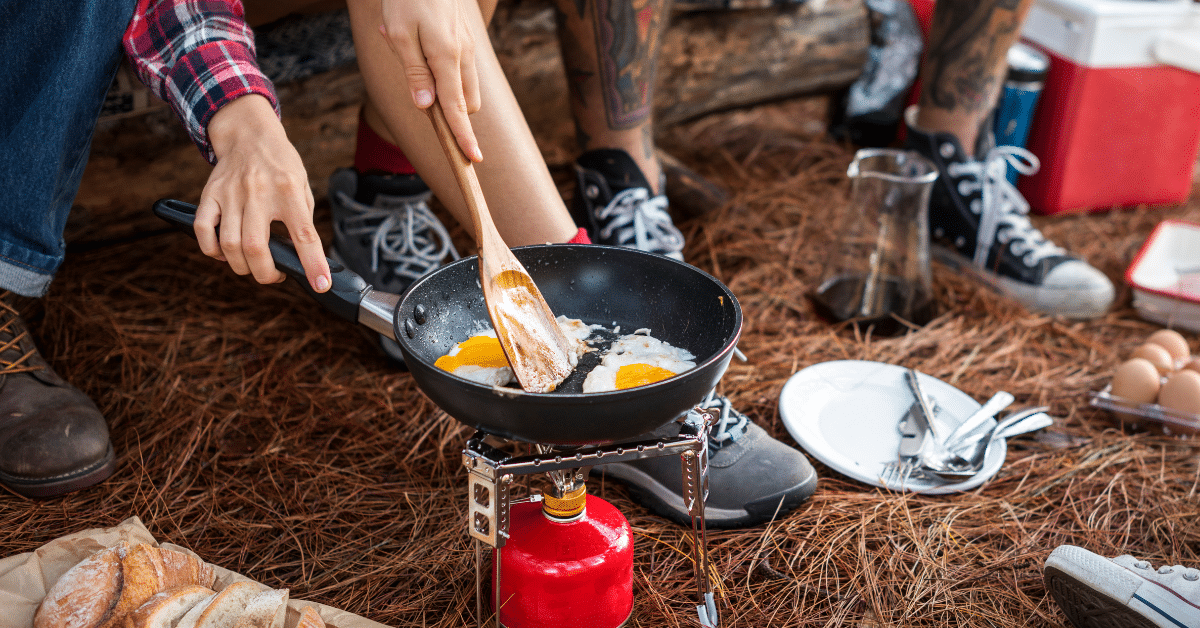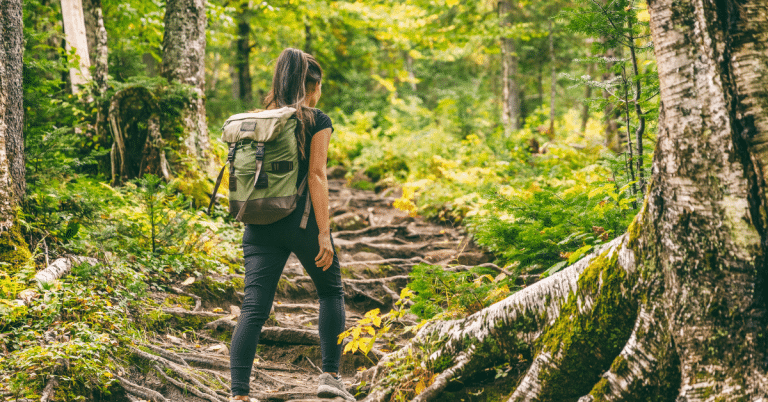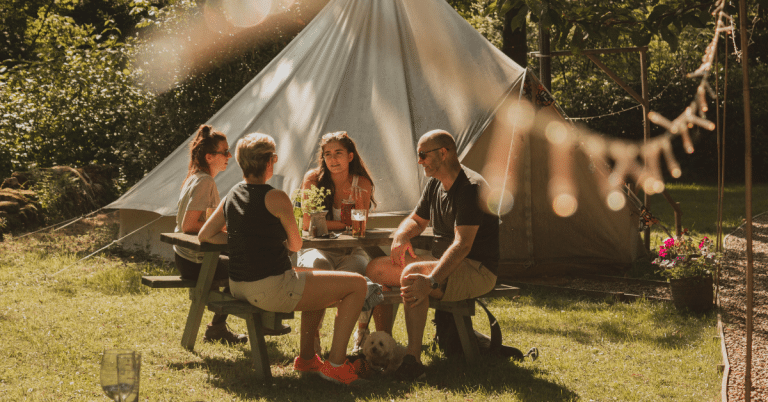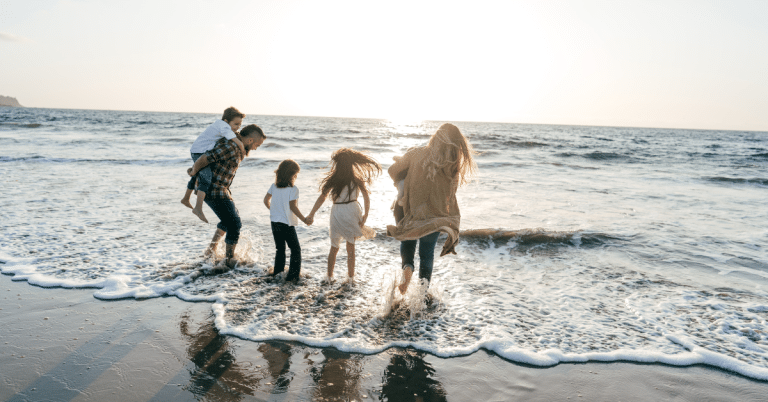5 Tips for Stress-Free Camping Meals

Author: Hannah Healy
Camping is a popular way for families to take a break from the hustle and bustle of city life.
A 2022 annual camping report by Kampgrounds of America, Inc. (KOA) estimated that a whopping 57 million households in North America went camping at least once in 2021. But when it comes to eating in the great outdoors, camping meals can sometimes add a lot of stress onto what is supposed to be a peaceful vacation.
Have you ever tried to flip meat on a grill with a fork because you forgot to bring tongs?
Have you struggled cleaning up broken eggs because your eggs fell out of the carton in the bustle of unpacking your car?
People spend a lot of time and money on the best camping gear to make their setup easier, so why not optimize your camping meals too? The following tips and hacks will make your camping meals a breeze so you can enjoy your outdoor retreat stress-free.
1. Choose Camping Meals That Are Quicker and Easier
If you are one of these millions of campers, keep it simple with camping food; you don’t want to be too ambitious. Stick to simple recipes that involve only a few steps or ingredients. Think about how you’ll be cooking and plan accordingly.
What Are Good Foods To Make When Camping?
Kabobs and Skewers
Foods on a stick are always a winner when it comes to camping. Add cubes of your preferred meat or seafood and stack them on skewers between fresh vegetables or fruits (pineapple is a great choice!). Pack the skewers along with your marinade in a ziplock bag. Let them marinate in the refrigerator for at least a day before your camping trip.
Try these easy-to-make lemon herb chicken kabobs for a bright, fresh summer camping recipe. This healthy dinner idea features zucchini, tomatoes, onions, and grilled chicken on skewers and works well when assembled and marinated ahead of time.
If you like a sweet and spicy combo, these bbq grilled shrimp skewers are a great option. This simple recipe only takes about 20 minutes to make from start to finish.
Grilled Meats & Vegetables
There’s nothing more synonymous with camping than cooking food over an open fire. That’s why grilled meats and vegetables are such a staple for camping.
Suppose you’re in the mood for a more complex spice profile. In that case, this tandoori chicken is one of my favorite dinner recipes that can be packed up in a ziplock bag to marinate beforehand and placed on the grill at mealtime. The result is a juicy and aromatic dish for lunch or dinner.
Remember hamburgers, hot dogs, sausages, and corn on the cob. These simple yet classic camping foods taste best when cooked over an open flame. If you want to spice up the classics, try these Dominican hot dogs or gorgonzola buffalo burgers.
Tin Foil Meals
Creating recipes in a foil packet makes cooking while camping so much easier. You can combine meats, fish, veggies, or potatoes with marinade, spices, or sauces and wrap them in an aluminum container to cook directly over the fire.
This salmon foil meal is infused with garlic herb butter, creating a succulent and flaky fish. This dish is a perfect elevated option to prep before your trip.
This seasoned shrimp boil recipe cooks easily in foil packs on a campfire. With delicious garlic, old bay seasoning, and lemon flavors, it’s a creative camping dinner idea that will surely please the whole family.
Skillet or Dutch Oven Meals
Whether you’re using a skillet on a camp stove or a pot on the fire, there are many simple meals to make this way.
Prioritize simpler one-pot meals to make your life easier, like this camping breakfast hash loaded with eggs, hashbrowns, and sausage. Scrambled eggs and bacon or breakfast burritos are another simple and easy choice for the day’s first meal.
Looking for comfort food? Try reheating pre-made spaghetti and meatballs for a fun Italian feast. Did you know you can also make pizza in a cast iron skillet while camping?
Sandwiches
Sandwiches are excellent camping food because they’re quick and don’t require any cooking. Classics like turkey, ham, or tuna are always filling. Creative choices like Caprese, pulled pork, or homemade meatball subs can be a fun departure from the norm.
You can either bring all the sandwich fixings to make at the campground or make the sandwiches at home. Remember to omit wet ingredients like mayo or mustard since they can make the bread and lettuce soggy. Take sauces with you and add them to your sandwich right before you eat it.
Canned Foods
Canned foods don’t need any refrigeration. They pack easily, don’t require prep work, and cook fast in a pot or skillet, making them the perfect camping food. In a pinch, you could even heat the can over a campfire. Just remember your can opener!
Here are some great canned food options to take camping:
- Tuna
- Beans
- Soups
- Chicken
- Fruits
- Vegetables
- Pureed Sweet Potatoes
- Tomato Sauce & Pasta Sauce
- Coconut Milk
2. Do as Much Preparation at Home as Possible
Stress-free camping meals are all about planning and preparation. The more prep at home, the simpler meal times will be at the campsite.
Create a Meal Plan
Think about the days you’ll be camping, and write down the dishes you’ll want for breakfast, lunch, dinner, and snacks. Consider which foods will spoil sooner and plan to eat those earlier in the trip.
Prep Foods Ahead of Time
Go through your meal plan and determine what ingredients you need to cook each meal. Prep as much as you can before you leave for your trip.
- Wash vegetables
- Chop vegetables
- Marinate meats in ziplock bags
- Put together kabobs onto the stick
- Cook pasta
- Divide meals into bags
- Put aluminum foil meals into separate portions
- Cut up fruit for snacks and store in ziplock bags
- Hard Boil eggs for snacks
You can buy or make most snacks and desserts ahead of time. Chips, crackers, nuts, pretzels, trail mix, and popcorn are wonderful camping snacks. If you want homemade cookies, brownies, muffins, or cakes for dessert on your trip, plan on making those a day or two before your trip. It’s always nice to have a little something sweet besides s’mores!
3. Get Creative With Food Storage
We often forget how much stuff we have to pack when it comes to camping. All the little things add up, and loading/unloading the car can become cumbersome and arduous. Try to take out excess packaging or heavy items wherever possible—store stuff in easy-to-pack ziplock bags instead of glass containers, jars, or bulky Tupperware.
Here are some genius hacks to make packing your camping meals easier:
- Instead of bringing a whole carton of eggs hoping they won’t get crushed, break open your eggs into a ziplock bag or secure storage container before you leave and keep it in the cooler. You can even have separate bags with the right amount of eggs for each morning.
- Don’t just pack your cooler with ice or ice packs. Save some space by freezing bottles of water, soups, or pre-made meals to keep everything in your cooler cold in addition to ice. Remove items as needed to defrost when you get to the campsite.
- Ditch the bulky spice bottles and use daily pill organizers to bring a variety of herbs and spices easily.
4. Don’t Forget Campsite Cleanup and Utensils
Cleanup and utensils are two of the most commonly overlooked things when camping. Have you ever had to clean a skillet by wiping it out with a paper towel because you forgot a sponge and dish soap? Have you had to pick up a hot Dutch oven with a couple of T-shirts because you didn’t pack pot holders?
Ensure you include the little things in your planning and packing to make your camping cooking experience easier.
Here’s a list of items related to camp cooking that people often forget to pack:
- Sponges
- Soap
- Tongs
- Spatulas
- Pots and pans
- Tinfoil
- Scissors
- Pot holders
- Trash bags
- Dish towels/paper towels
- Plates
- Cups
- Bowls
- Cooking oil/butter
- Coffee
- Creamer
- Utensils (forks, knives, spoons)
- Salt & Pepper
- Condiments (ketchup, mustard, mayo)
5. Cook Meals According to What Is More Perishable
When deciding what you should eat each day of the camping trip, prioritize eating the more perishable dishes first and the less perishable things last. If you’re bringing marinated chicken kabobs, those would be best consumed on the first day of camping, while you can consume canned foods on the last day. Turkey sandwiches or spaghetti with meatballs would go somewhere in the middle.
In the cooler, keep the foods that go bad faster directly on the ice so they’ll last longer.
Camping Meals Review
After going over the must-dos for easier camping meals, it’s clear that planning and preparation are essential for a relaxing and enjoyable nature retreat.
Easy-to-make meals like kabobs, one-pot dishes, and aluminum-wrapped meals are best for camping. Detailed meal planning of each meal during a camping trip helps avoid packing too much or worse– not enough food.
When it comes to camping meals, the bulk of the work should come before you even leave for the trip. Spend more time preparing your food as much as you can before you go. Plan how and what you’ll be packing, and don’t forget items for cleanup!
This article originally appeared on PinkWhen.





